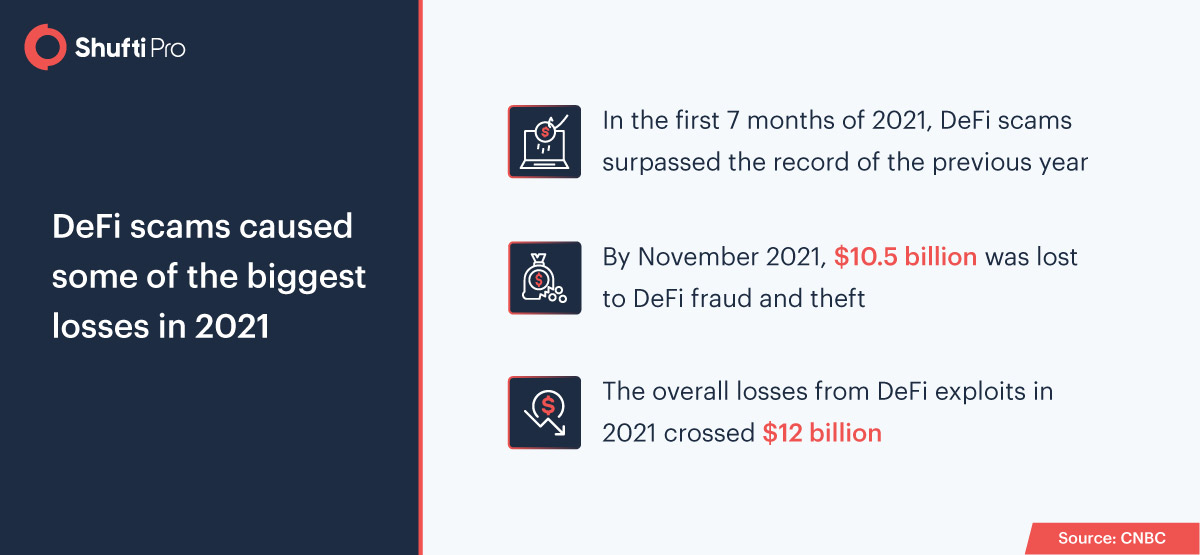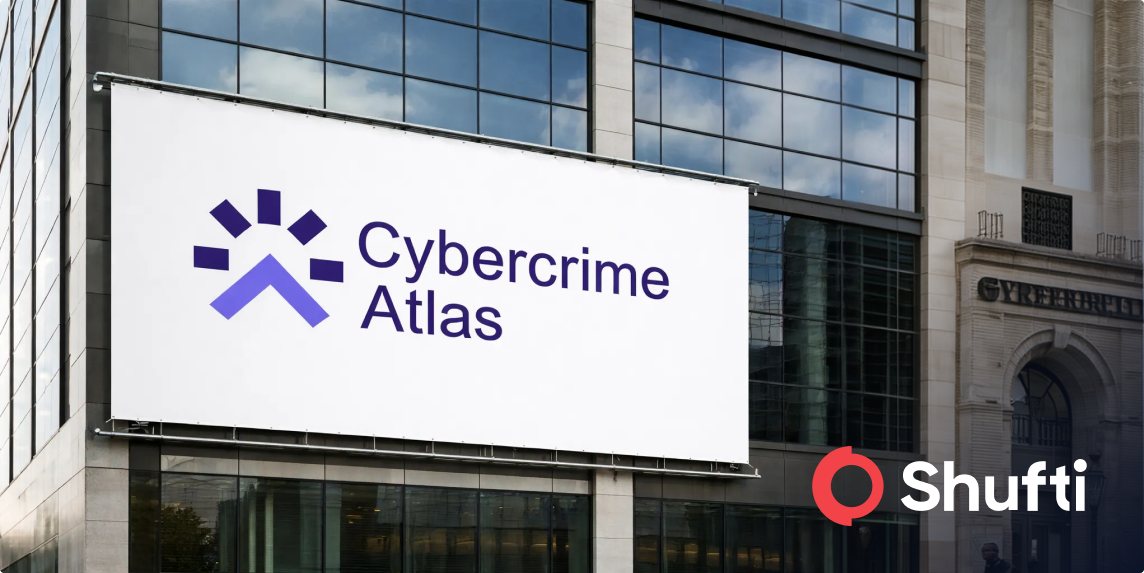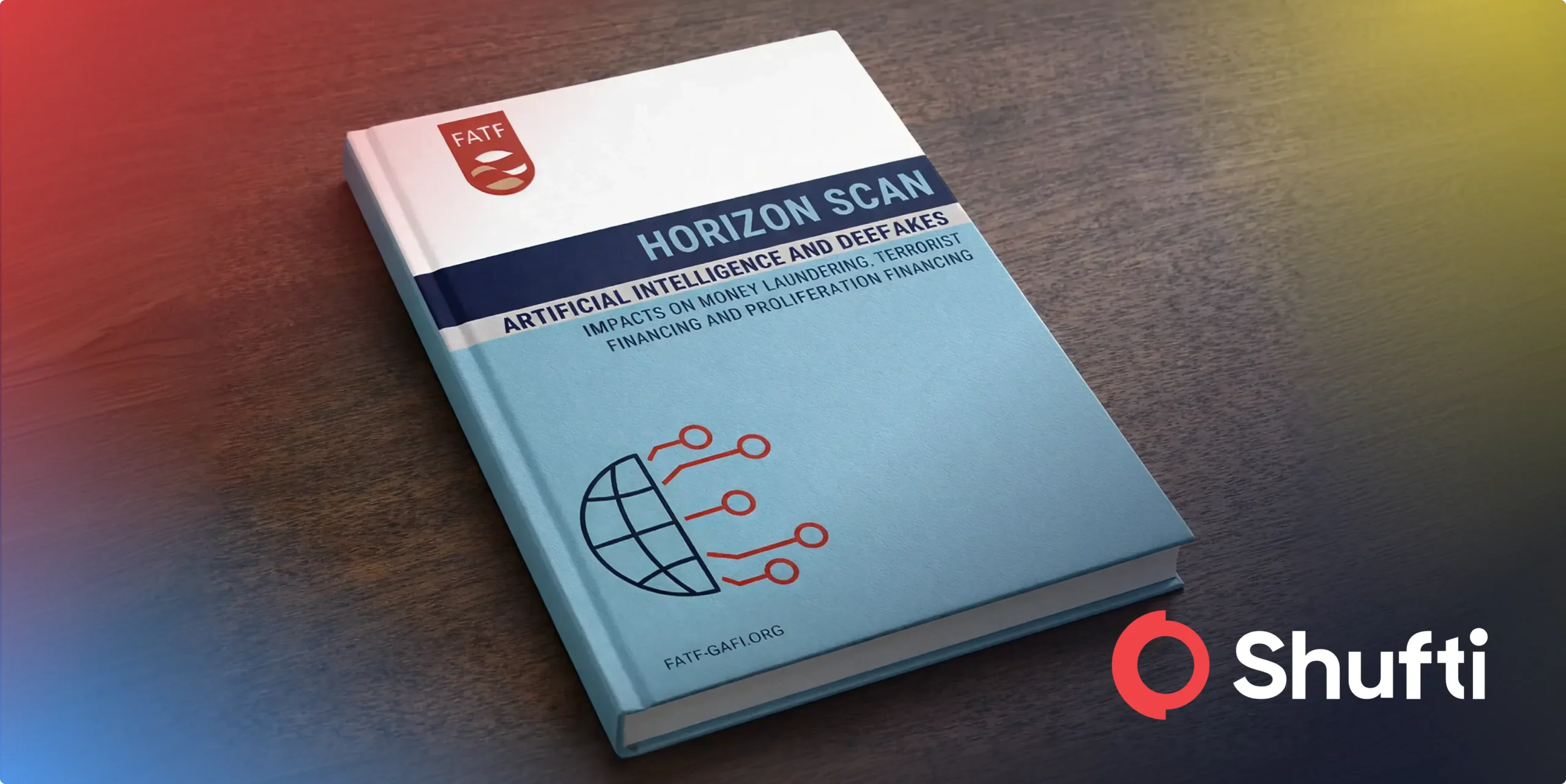KYC Compliance for DeFi Platforms – Finding the Balance for a Secure Future

The rise of decentralized services in the form of digital asset trading platforms and DeFi constantly make the headlines because of the unlimited opportunities and benefits they provide. However, DeFi platforms do attract the attention of criminals and wealthy politicians looking to launder money and finance terrorist activities.
While the fast-paced DeFi industry grows and revolutionizes financial operations, regulators continue to criticize the loopholes in the system. The lack of centralization resulted in record-breaking losses of $10.5 billion to DeFi scams in 2021. As a result, regulators are pushing DeFi platforms to incorporate advanced KYC (Know Your Customer) solutions.
What Makes DeFi Vulnerable to Fraud
In simple terms, DeFi enables customers to access and get value from products and financial services without having to go through a centralized banking system or intermediaries. DeFi’s borderless nature allows anyone from anywhere in the world to conveniently access financial services. Eliminating the intermediaries or centralized banks and replacing it with a blockchain-based decentralized systems creates an ease for customers and businesses to get through financial processes like trading, loans, and lending on their own. Where the exponential growth of DeFi has proven the success of blockchain as a revolutionary technology, it has also given rise to new kinds of fraud.
As crypto exchanges were initially not required to implement KYC compliance measures, financial criminals saw it as the ideal sector for fraud, money laundering and terrorist financing. Afterall, financial criminals need a medium where there are little to no AML screening measures, every user is anonymous, and the currency is decentralized. That being said, things have changed for the better, as there are now regulations for central DeFi service providers. Considering the rising popularity of these services and the subsequent increase in losses, regulatory bodies formulated laws that are applicable to virtual asset providers. In Germany, a new rule was created that requires crypto service providers to get a crypto custody license.
However, the relatively less regulated DeFi still brings significant risks of money laundering and fraud. The lack of central institutions and pressure from financial regulators makes it rather tough to put an end to illicit activity in this sector. Comprehending and setting up rules for DeFi platforms where no intermediaries or institutions are involved is a real problem for regulators. The international Financial Action Task Force (FATF) issued a new guidance for virtual asset service providers (VASPs) targeted specifically at DeFi platforms. In this guidance, the FATF recommends initiating crackdowns against any DeFi platform that does not have robust measures for KYC and AML Screening.

Regulations for DeFi Platforms
The global financial watchdog FATF is the regulatory body that set forth most of the regulatory guidelines that global financial institutions follow to maintain a fraud-free system. The updated guidelines for Virtual Asset Service Providers (VASPs) was issued in June 2019 to create a balanced regulatory landscape where traditional financial institutions adn VASPs are obliged to follow similar rules. Following the issuance of these guidelines, global regulatory authorities have adopted the updated rules and implemented the changes for the prevention of fraud and financial crime.
As a result, DeFi platforms are now obliged to report suspicious activities, transactions and other Know Your Customer (KYC) information in the same way as traditional banks. However, most of the VASPs, like crypto trading platforms and DeFi platforms, have relatively weak KYC measures in place. With the rising popularity and a rather lenient check from the regulatory bodies, threats of financial crimes are prevalent in the DeFi sector. There are also the risks arising from loopholes in blockchain structure, which takes regulations from authorities as a set back to it’s future growth and development.
Considering a real world situation, it is quite evident that blockchain-based crypto and DeFi platforms have seen a strengthened structure by incorporating KYC measures and have been able to curb financial crimes as well as threats of cyberattacks. Growth in any kind of business or financial institution is largely dependent on customer trust, which makes or breaks the customer bank.
How KYC Secures DeFi
The commonly perceived notion that decentralized platforms and financial services are completely unregulated is slowly changing as both technology and rules are evolving. KYC verification is an optimum solution for businesses operating within the spectrum of DeFi. In order to avoid the record-breaking losses to crimes like money laundering and terrorist financing, DeFi platforms are now turning towards compliance with improved regulatory frameworks.
The EU’s Fifith Anti-Money Laundering Directive (AMLD5) has been a key source for the German financial supervisory authority BaFin in developing a separate category for crypto custody businesses and DeFi. The new category has been added in the German Banking Act (Kreditwesengesetz – KWG) as a one-of-a-kind “authorization of crypto custody businesses”, where the EU’s AMLD5 regulations are used as a bases for similar authorization of licenses for DeFi services.
In order to comply with updated regulations, business entities and financial investors need digital solutions that they can totally rely on. Major market players like Robinhood and PayPal are among NFT marketplaces like OpenSea that have taken steps to incorporate the mandatory checks with the help of digital AI-driven KYC solutions. Therefore, KYC/AML compliance proves beneficial for DeFi to develop and grow with improves services and mass adoption.
What Shufti Offers
To sum it up, the ongoing debate about pros and cons of KYC has caused a division where the good and the bad of DeFi can easily be differentiated. DeFi platforms and service providers now have the choice to make between KYC solutions and regulatory penalties or losses to financial crime. Shufti offers a robust KYC verification solution to DeFi platforms that are looking to develop a fraud-free system. Out KYC solution verifies identities in 230+ countries and territories with an accuracy of 98.67%.
Want to learn more about our KYC solution for DeFi platforms?

 Explore Now
Explore Now













